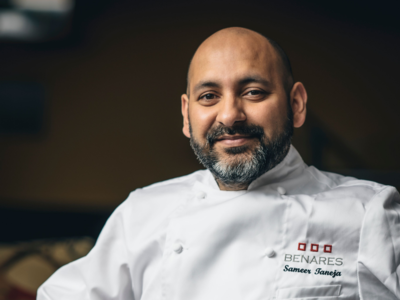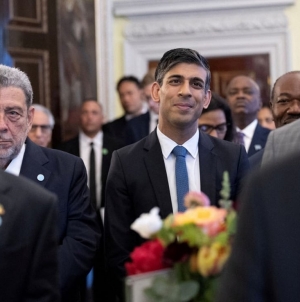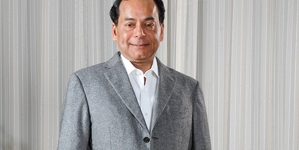-
TORONTO: India strongly protests ‘Khalistan’ slogans at a public event attended by Canadian leaders - 14 hours ago
-
TOKYO: Japan Offers Scholarships To Indian Students Pursuing Research - 2 days ago
-
ZAGREB: India-Croatia Foreign Office Consultations (FOC) - 2 days ago
-
BUCHAREST: Government Of Romania To Offer Scholarships To Indian Students - April 30, 2024
-
WASHINGTON: India Now Second-Largest Source Country For New Citizens In US- Report - April 30, 2024
-
LONDON: Run For Modi” Event In London To Drum Up Support For PM Modi - April 29, 2024
-
LONDON: Indian-Origin Candidate On How He Plans To Win London Mayoral Polls - April 28, 2024
-
HARVARD: No Country Is Perfect”: Physics Wallah Urges Indian Students At Harvard, Stanford To Return - April 27, 2024
-
CALIFORNIA: PM Modi Put India On World Map As Credible Innovator- IT Industry Leaders - April 26, 2024
-
WASHINGTON: Indian Students Bag NASA Awards For Human Exploration Rover Challenge - April 25, 2024
LONDON: Chef Sameer Taneja enjoys being part of a good Indian restaurant ‘mafia’ in London
LONDON: He’s an executive chef at one
of London’s most upscale Indian restaurants — Benares — in the tony Mayfair
district. But ask Sameer Taneja about his signature dish and you’ll get him
talking about his mother’s chaats he grew up with in India.
“Not a signature dish but a favourite one, which I have recreated, is the
cured sea bream and oyster chaat. It’s closest to my heart and represents my
mother’s cuisine. She taught me that Indian chaat goes beyond the ingredients
and tingles all the taste buds at the same time. Umami, bitterness, salt, sweet
and sour all at one point,” the Delhi-born chef said from London.
His own version of chaat, which
for him ticks all the boxes, combines saltiness of oysters, is garnished with
crispy Indian boondis and served with sour aam-panna (mango) dressing.
Taneja, whose first job after
college was at the prestigious Oberoi Rajvilas Jaipur, moved to the UK in 2003
and has worked at many famous restaurants in London with big names such as
Michel and Alain Roux at Waterside Inn in Bray, and Pierre Koffmann at
Koffmann’s in Mayfair.
“I came to the UK not because I wanted to leave India, but because I
wanted to cook at the best Michelin-starred restaurants. During the two years
at Oberoi, I worked with French and English chefs and the high standards of
cooking were implanted in my head. Landing a job at One-O-One Restaurant, which
is London’s best for seafood, was an immense journey for a young Indian boy
back then,” he reminisced.
Taneja — who first joined Benares as head chef in 2012 but left three years
later to launch his own restaurant, Talli Joe, in Covent Garden — returned as
an executive chef in 2019. Talking about the difficult months triggered by the
Covid-19 pandemic, he feels that the idea of fine dining in London is coming
back but with changes.
“It was hard for us but we tried to remain positive and hopeful. At
Benares, we found alternative ways to keep the restaurant running and meet the
demand from regular customers,” he said. It was also important to support
the National Health Service (NHS) medical community during the pandemic and the
management of the restaurant saw an opportunity in donating over 10,000 hot and
nutritious Indian meals to frontline workers in their effort to give back to
the local community.
The chef now believes that fine dining will be defined by the total experience
of the diners rather than a fancy setting or expensive ingredients. “We
certainly use expensive ingredients but the approach is more about sustainable,
fresh and organic local produce,” he explained. And London, for him, will
continue to remain a gastronomic capital, even if the approach to fine dining
is a bit different in the post-pandemic world.
Taneja sees a huge impact of Indian cuisine in London with the largest number
of Indian restaurants making it to the prestigious Michelin Guide of fine
dining. “London has the largest number of Indian restaurants in the world
and the fact that a very small number of them shut doors during the pandemic shows
how high the demand for Indian food is,” he said.
The trend of small Indian
restaurants serving single origin, regional cuisine from different Indian
states, is something that the chef is upbeat about. “The UK has a whole
big Indian restaurant mafia, but in a very good way.”
He was picked as the head chef
for Benares and mentored by chef Atul Kochhar, who he still admires as a mentor
and “living legend”. But Taneja’s own journey as an entrepreneur,
when he left to start his own restaurant venture, ended in disappointment.
“It was a bar-led restaurant
with a desi menu inspired by traditional regional food of India. Everything,
including the innovative cocktails, was done differently in a playful and fun
way,” he recalled. And though he feels very sad about having had to close down
the venture, he believes that with the immense learning that he has gained from
the entrepreneurial journey, he will again open his own restaurant someday.
When he is not cooking, Taneja spends quality time with his wife, son
and daughter aged 11 and five. “I love my job and the pleasure that I find
in cooking Indian food with local British produce keeps me going. But I also
find positive energy from the time that I spend with my family,” he said.
Gardening on their home turf in London and growing potted flowers and
vegetables is a hobby that the family enjoys together.
























